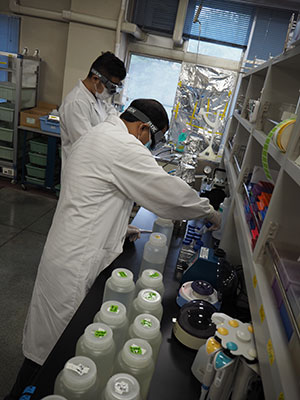News & Topics
Researchers of the SATREPS Nepal project reported the first case of SARS-CoV-2 detection in wastewater in Japan
Science and Technology Research Partnership for Sustainable Development (SATREPS)
Professor Eiji Haramoto of the University of Yamanashi, collaborating with Associate Professor Masaaki Kitajima of the Hokkaido University, successfully detected SARS-CoV-2 in wastewater. Prof. Haramoto has been a research member of SATREPS Nepal project (May 2013–September 2019) led by Research Leader, Professor Futaba Kazama of the University of Yamanashi.
A research group of Haramoto and Kitajima obtained a total of 13 water samples from rivers and a wastewater treatment plant (WWTP) in Yamanashi prefecture from March 17 to May 7, 2020. They detected the SARS-CoV-2 in one of the samples through the polymerize chain reaction tests of the samples. The sample was secondary-treated wastewater before chlorination in the WWTP and was collected on April 14. The research group observed that the time of detection of the virus in the sample coincided with the time of the highest peak of the number of daily cases of COVID-19 infection reported in the prefecture (mid-April). Additionally, the time of no detection of coronavirus in the samples overlapped with the time when newly infected people in the prefecture were none or one.
This method of monitoring SARS-CoV-2 using sewage is called wastewater-based epidemiology (WBE) that enables a simultaneous survey across a wide range of area. Therefore, WBE is expected to be a method to predict possible “disease outbreaks” and “a second wave of outbreak” of the COVID-19 infection.
Moreover, two Nepal researchers who studied in the same laboratory with Prof Haramoto have joined the research team. A researcher Bikash Malla entered Graduate School of the University of Yamanashi in 2014, the kick-off year of SATREPS Nepal project and earned his doctorate during the project term. Ocean Thakali, a second-year student of the doctoral course, joined the project at the medical school of Tribhuvan University, a partner country’s institution of the program, at the half term of the project. He has been studying in Japan as a government-supported student since October 2018.
“I am proud of them that they, who have interest in the water issues through the research of the SATREPS project, have vigorously worked to contribute to the research of the World Pandemic of COVID-19,” says Prof. Haramoto. “They also seemed to be pleased that they could join the forefront research of the world.”
We hope the researchers involved in the SATREPS projects continue novel research even after the project ended.
- [Press release by the University of Yamanashi and Hokkaido University] (JP)
- https://www.yamanashi.ac.jp/wp-content/uploads/2020/06/20200626pr.pdf
- [Contact]
- International Research Center for River Basin Environment,
Graduate Faculty of Interdisciplinary Research, University of Yamanashi
Dr. Eiji Haramoto
4-3-11 Takeda, Kofu, Yamanashi 400-8511, Japan
E-mail: eharamotoyamanashi.ac.jp
- [Project Information]
- SATREPS “Hydro-microbiological Approach for Water Security in Kathmandu Valley, Nepal”
https://www.jst.go.jp/global/english/kadai/h2502_nepal.html (EN)

Researchers Bikash Malla and Ocean Thakali filtering the water samples
